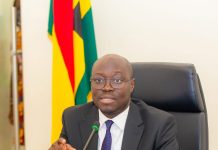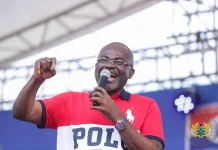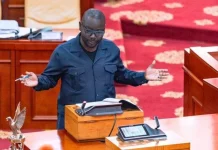The International Monetary Fund (IMF) and the Government of Ghana have reached a staff-level agreement on the fourth review of Ghana’s 36-month Extended Credit Facility (ECF) programme. The agreement, once approved by the IMF Executive Board, will unlock the release of US$370 million in funding support to Ghana.
This brings the total disbursement under the program to approximately US$2.36 billion since its approval in May 2023.
The agreement follows a two-week mission by an IMF team led by Stéphane Roudet, Mission Chief for Ghana, who met with key government officials and stakeholders between April 2 and April 15, 2025, in Accra.
According to a statement issued at the end of the mission, Ghana experienced stronger-than-expected economic growth in 2024, driven by robust activity in the mining and construction sectors. The country also recorded a significant improvement in its external sector, supported by increased exports — particularly gold — and higher remittance inflows, leading to strong accumulation of international reserves.
However, program performance deteriorated sharply towards the end of 2024. Fiscal data indicated slippages in the run-up to the general elections, including a large build-up of government payables. Inflation also rose above the program’s target, and delays were recorded in implementing key reforms in fiscal management, the financial sector, and energy policy.
To correct these slippages, the new administration has introduced bold measures, including the passage of a strong 2025 budget targeting a primary surplus of 1.5% of GDP. A comprehensive audit of accumulated payables is underway, and public financial management reforms have been launched to tighten spending and improve fiscal discipline.
The IMF noted that the Bank of Ghana has increased its policy rate and is reviewing its liquidity operations to curb inflation, which is expected to decline under tighter monetary and fiscal policies.
Engagements also focused on strengthening social protection programs to support the most vulnerable Ghanaians amid economic adjustments. The IMF team acknowledged Ghana’s commitment to enhancing governance, transparency, and reforming the management of state-owned enterprises, particularly in the cocoa, gold, and energy sectors.
On energy, the resumption of quarterly electricity tariff adjustments and structural reforms is expected to reduce sector shortfalls and prevent the accumulation of new arrears.
Ghana is also progressing with its public debt restructuring program. The Memorandum of Understanding (MoU) under the G20 Common Framework has been signed by all members of Ghana’s Official Creditor Committee. The next step is the conclusion of bilateral agreements and ongoing discussions with commercial creditors to secure a comprehensive and sustainable debt treatment.
The IMF team expressed gratitude to Finance Minister Dr. Cassiel Ato Forson, Bank of Ghana Governor Dr. Maxwell Opoku-Afari, and other stakeholders for their cooperation and constructive engagement during the mission.
Ghana|Atinkaonline.com| IMF Communications Department


























